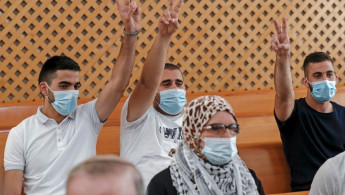Israeli Supreme Court offers Palestinians in Sheikh Jarrah 'protected tenants' status
Israel's Supreme Court on Monday proposed to have Palestinian residents of Sheikh Jarrah remain in their homes under a "protected residents" status, ensuring they will not face eviction "in near future".
The court session, which was supposed to issue a final ruling on the high-profile case involving four Palestinian families in the occupied East Jerusalem suburb who face imminent eviction, ended in a stalemate as another hearing was scheduled in seven days.
According to the proposed compromise, the Palestinian families, who have been living in the neighbourhood since the 1950s, would be categorised as "protected tenants" who cannot be evicted.
The residents, who have built their own homes on the land, will however have to pay a "rent fee" to Nahalat Shimon, a settler organisation that claims Jews held land in Sheikh Jarrah in the 19th century under Ottoman rule.
Lawyer Husni Abu Hussein, who has been representing the Palestinian families since 1994, had travelled to Turkey to consult Ottoman archives and found no trace of the settlers' claims.
The four families are part of a group of more than 500 Palestinians - comprising 28 families - facing expulsion from the neighbourhood.
The threatened Sheikh Jarrah expulsions have drawn international condemnation and sparked global outrage.
The Palestinian families, who were expelled from their original homes during the creation of Israel in 1948, have lived there since 1956.
The homes were constructed on land provided by the government of Jordan - which ruled Jerusalem until 1967 - and under the supervision of the UN Relief and Works Agency for Palestinian refugees.
'Practical agreement'
The representative of Nahalat Shimon, Attorney Ilan Shemer, opposed Monday's proposition and demanded the families recognise the Jewish ownership of the land.
The Palestinians families were "pressured to agree" to the compromise, according to Al-Araby Al-Jadeed correspondent in Jerusalem - but have rejected the settlers' demand.
Justice Isaac Amit urged all sides to focus on the issue.
"What we are saying is, let's move from the level of principles to the levels of practicality," said Justice Amit.
"People must continue to live there and that's the idea, to try to reach a practical arrangement without making various declarations. We have seen how much this interests the media. We want a practical solution."
The Israeli government had dismissed the Sheikh Jarrah case as a "real-estate dispute between private parties".
Rights groups say the forced evictions are part of a broader move to drive Palestinians from their homes, in a city coveted by both sides as their capital, and cement Israeli occupation over the whole of Jerusalem.
Human Rights Watch, in an April report, accused Israel of "apartheid". It described "discriminatory laws and policies" that "enable settler and settler organisations to take possession of Palestinian homes".
Since 1967, Israeli authorities have expropriated nearly one-third of the land in East Jerusalem from Palestinians, largely via settlements, it said.





 Follow the Middle East's top stories in English at The New Arab on Google News
Follow the Middle East's top stories in English at The New Arab on Google News
![22 Arab countries at COP29 have rejected the targeting of fossil fuels [Getty]](/sites/default/files/styles/image_330x185/public/2024-11/GettyImages-2184289638.jpg?h=199d8c1f&itok=ptHl5bec)
![Dozens of people turned out for the funerals [Getty]](/sites/default/files/styles/image_330x185/public/2024-11/GettyImages-2185229760.jpg?h=e7c891e8&itok=1bctDcE6)
![The UAE is widely suspected of arming the RSF militia [Getty]](/sites/default/files/styles/image_330x185/public/2024-11/GettyImages-472529908.jpg?h=69f2b9d0&itok=Yauw3YTG)